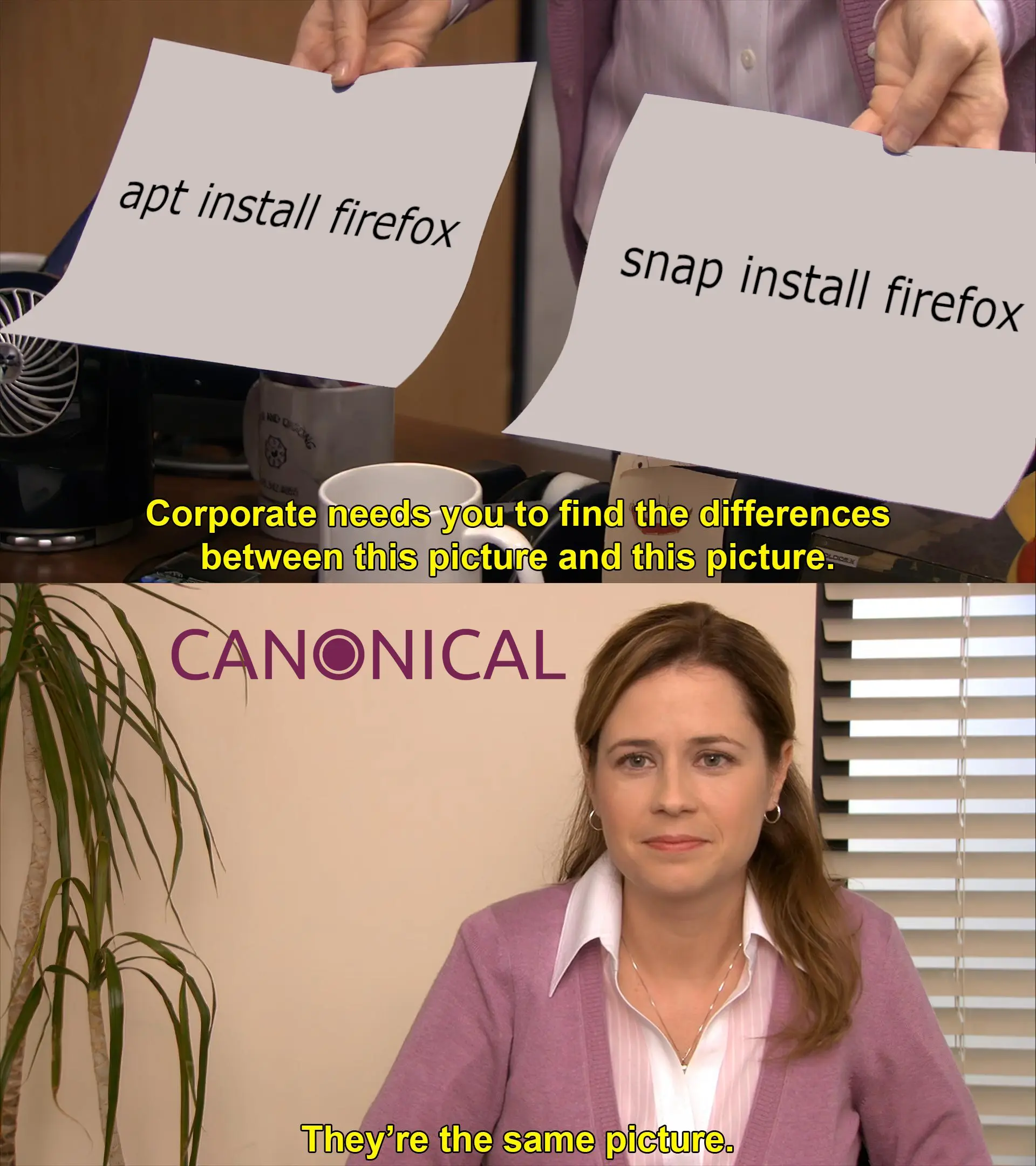Is it me or Ubuntu secretly replaces DEB Firefox with Snap Firefox?
-
[email protected]replied to [email protected] last edited by
Solve the problem. Drop ubunutu
-
[email protected]replied to [email protected] last edited by
Yes. That was the last straw for me. I switched to debian stable, and haven't looked back since
-
[email protected]replied to [email protected] last edited by
Hah! Me too, exactly this.
-
[email protected]replied to [email protected] last edited by
No defending Ubuntu but wasn't this clarified to be Mozilla's deploying it via Snap and requesting to remove the apt installation?
-
[email protected]replied to [email protected] last edited by

-
[email protected]replied to [email protected] last edited by
Because not everyone wants to spend their time babysitting an OS and Ubuntu has a 20-year track record of dependability.
-
[email protected]replied to [email protected] last edited by
It takes a little more than just adding a different repository to your package manager, you have to tell apt which to prefer:
echo '
Package: *
Pin: origin packages.mozilla.org
Pin-Priority: 1000Package: firefox*
Pin: release o=Ubuntu
Pin-Priority: -1' | sudo tee /etc/apt/preferences.d/mozilla -
[email protected]replied to [email protected] last edited by
Exactly. Enough with the inane conspiracism.
-
[email protected]replied to [email protected] last edited by
Why even enable snaps? It's like asking to have headaches.
-
[email protected]replied to [email protected] last edited by
Well then you haven't been following it closely. As someone else said, the reason is simple: the Snap version is more recent (like it or not) and in Ubuntu
aptis configured to take into account Snap packages. -
[email protected]replied to [email protected] last edited by
It's more than that. Ubuntu copies the Debian repos and then applies their own changes on top. Debian has a native (DEB) Firefox package, so Ubuntu specifically has to remove it for every new version.
-
[email protected]replied to [email protected] last edited by
It's a dilemma; most Windows and Mac users would benefit from that kind of locked-down, idiot-proof format. Even having the choice of multiple repos is too much for them. So while I personally hate it, that's what most people (i.e. non-Linux users) want and need.
I recommend Ubuntu as the beginner distro for everyone, but with the hope that they eventually drop the training wheels and switch to Debian.
-
[email protected]replied to [email protected] last edited by
Debian testing just isn’t a very good rolling release disto
What makes you say that?
-
[email protected]replied to [email protected] last edited by
I agree Ubuntu is the easy choice. You can totally find a desktop you don't have to baby sit, but Ubuntu has the marketing to help you find them and feel safe.
I've had no issues with fedora, I've been running it for about a year.
-
[email protected]replied to [email protected] last edited by
You could compile it from source yourself, and you won't even have to worry about packaging and package managers.
-
[email protected]replied to [email protected] last edited by
Exactly. But I would go further. I think Linux needs flagship distros with big solid institutions behind them, and it needs us to support those distros by using them. I know this is not an popular opinion here.
I see those flagship distros precisely as Fedora and Ubuntu.
-
[email protected]replied to [email protected] last edited by
While I get that, Debian fits that role extremely well.
-
[email protected]replied to [email protected] last edited by
I think fedora is best for user that want a recent kernel and reasonably fast update cycle (like not a year behind) but are not interested in rolling (for whatever reason ever).
I love rolling and had no issues due to rolling yet
-
[email protected]replied to [email protected] last edited by
How did you get snap on mint?!
 I once tried it as a noob and mint was always “snap bad! Don’t do this! You will regret” even on try to circumvent it
I once tried it as a noob and mint was always “snap bad! Don’t do this! You will regret” even on try to circumvent it 
-
[email protected]replied to [email protected] last edited by
I was waiting for this! Debian is great. I used it for years. But IMO it's not polished enough for normies. The website is fugly and the onboarding funnel assumes too much knowledge. The installer, last time I tried it, was glitchy and unintuitive. I think that techies underestimate how offputting even ostensibly minor issues like this will be to ordinary users. Also, Debian has a ton of unmaintained packages (altho I gather that something is being done about this). Debian is fundamentally amateur in the best and unfortunately worst senses. I think a Linux flagship distro needs to be more pro and systematically thought out. For that, it's always going to help to have a big company or organization behind it.


